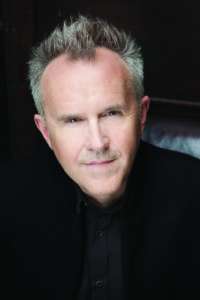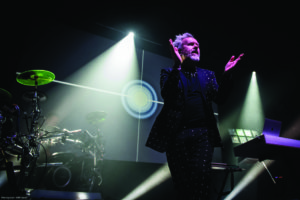
If you lived through the 1980s and listened to pop radio, chances are, at some point each day you would have heard one of the plethora of hit songs composed, performed and recorded by British synth-pop pioneer Howard Jones.
From the moment his ground-breaking debut single New Song hit both the American and U.K. charts in the fall of 1983, Jones’ star was on the ascent. By the time the 1980s had were out, he had chalked up an incredible 15 top 40 singles and sold millions of albums. He was also one of the artists chosen to perform on the biggest stage then conceived of when he played in front of tens of thousands at Wembley Stadium in London and for over 2 billion people on television as part of Live Aid in 1985.
With his music still garnering a great deal of airplay on terrestrial radio, thanks to the advent of the ‘80s and More’ format as well as on many specialty channels on satellite radio, Jones is as in demand as a live performer as he’s ever been, playing approximately 100 shows a year. This marks him as somewhat of a rarity amongst his contemporaries who don’t hit the road with nearly the same sort of frequency and enthusiasm as Jones does.
“I really love what I do. I love performing live and there are several ways that I play live. I do the sort of full band thing with a five-piece band and sometimes I add a brass section. Then there is the trio, which is what I am doing on these shows in Canada. And sometimes I go out and I do my solo shows as well, which I really enjoy doing, where’s its just me and a piano,” said Jones from his hotel room in London, Ontario prior to playing at Harris Park as part of the Rock the Park Festival.
“So, having that variety of venue and show makes it really interesting. On any given tour we could be playing some really huge festivals, like we are this summer. we may play to 30,000 people, and then I might do a solo show in a club and I will be playing to 300 people. Changing it up keeps it interesting, as I said, and challenging as well, and I love all that.

“And I know a lot of artists don’t like the travel aspect, and it becomes an issue of creativity to make that side of it work. I make sure I don’t do too many gigs in a row and try to have a day off in between so you can actually experience the place where you are visiting and things like that. Being creative in that way makes it easier and more enjoyable, not just for me, but for my crew and my band. It’s really thinking about quality of life considerations. Obviously, the shows are amazing and that is such a privilege to be able to do that and to play for people and make them happy. It’s a wonderful position to be in, but I think artists need to also be creative about what they do in between and how there get there.”
Over the past few years, there have been a resurgence in the popularity and esteem for much of the pop music crafted in the 1980s and for the artists who wrote and performed those songs, including Jones. To capitalize on this, artists and promoters have been putting together special 1980s themed festivals and tours, of which Jones has happily participated.
“In the U.K. they are hugely successful and really fun to play. And, also, I get to hang out with people from my era as well. It’s really great fun but I don’t think one should do those all the time. So, I do a lot of my own shows as well. It’s about keeping a balance there, but I have no problem at all playing those festivals because they are honestly such amazing things and people just love it. I think some people can get a bit snotty about that stuff, but I am not one of them.”
Jones’ litany of hits began with the aforementioned New Song, and continued through such radio and MTV/MuchMusic staples as Like to Get to Know You Well, Things Can Only Get Better, Life in One Day, No One Is to Blame, Everlasting Love and What is Love? As even the titles indicate, the subject matter and tone of the vast majority of Howard Jones songs is positive, uplifting and hopeful – which is perhaps why his songs, and many of those of his 1980s pop contemporaries, still retain their popularity and are even drawing in new and younger fans. Their sense of optimism, inspiration and personal empowerment is seemingly needed now more than ever.
“I know I always set out to do that; to give a very positive message in all the work – and I still do that. I do think that over time it comes home to roost and people who were enjoying it at first just because it was a new sound, suddenly realized what the lyrics were about, and that had and continues to have a big impact,” Jones explained.
“I very much realized how much impact music had upon me and how it could actually change my mood and uplift me when I was going through a bad time. And I thought I want to write music that does that; music that’s there for people when they’re really going through it and need a bit of a boost and when you need something to lift your spirits. A piece of music can really do that.
“The first single, New Song, says ‘don’t crack up, bend your brain, see both sides.’ But it also says, ‘don’t be fooled by what you see; don’t be fooled by what you hear.’ In other words, you have to think for yourself and you have to discriminate about what’s really the truth now. I am actually singing that song with much more conviction now then even when I first wrote it.”
The artists who did just that for a young, impressionable Howard Jones were John Lennon and David Bowie.
“John Lennon from the point of view of even one song which really sums it up, which is Imagine. And then there was Bowie saying to people ‘be who you are and don’t be afraid to be who you are. Don’t let people tell you that you can’t be yourself.’ And that was such a strong message and something I really related to. Although I didn’t become an artist like David Bowie, it was encouragement for me to be myself and not be afraid as an artist and to take what comes with it,” he said.
 Jones biggest hit songs were written at a unique time in history. In early 1980s Britain, the Tory government of Margaret Thatcher’s ultra-conservative policies were creating great social unrest, particularly amongst younger people. As well, globally, it was still considered to be a two-superpower polity with the threat of nuclear obliteration still a possibility. So, coming from that emotional and political impetus, it makes sense that those same songs of positivity he composed back then would have resonance in 2018 and the miasma of misery and division being fostered by populist movements, ultra-nationalism and discord.
Jones biggest hit songs were written at a unique time in history. In early 1980s Britain, the Tory government of Margaret Thatcher’s ultra-conservative policies were creating great social unrest, particularly amongst younger people. As well, globally, it was still considered to be a two-superpower polity with the threat of nuclear obliteration still a possibility. So, coming from that emotional and political impetus, it makes sense that those same songs of positivity he composed back then would have resonance in 2018 and the miasma of misery and division being fostered by populist movements, ultra-nationalism and discord.
“We’ve all got to be more vigilant about everything now and discriminating about what’s the truth and what isn’t, and stand up for what we believe in. Back then it was the era of the Cold War and there were a lot of people who were very scared about the future. I think that did cause a lot of thoughtful artists to be writing about serious things,” Jones said.
“And for me, politics has always been about our personal relationship with society. It starts with me, and if I want things to change, I’ve got to change myself. I always brought it back to that point: you can’t change the world by just changing the government or changing the politics. It doesn’t start there, it starts with the people. And so, I have always come from that point of view.”
Jones said too he believes that the passage of time has also allowed the music of 1980s to go through a serious process of re-evaluation and reassessment, with fans, critics and the music industry coming to the realization that it was a culturally significant moment in time.
“The 1980s were regarded as a very uncool era for a long, long time. It’s taken about 30 years for it to be sort of recognized for what it really was, which was some really, really great music, that was also so diverse. You had everything from indie rock to soul, electronic music to big stadium rock, glam and metal – all of these genres going on at the same time,” he said.
“And there was MTV and the whole visual aspect of it as well. People were also into writing songs that you could remember, and you could sing a long with. I think when you combine all those elements, that’s what I think a lot of young people are really enjoying about it. And with a lot of new musicians and a lot of new bands are referencing the 1980s and with analog synths are trying to recreate the sound that we started off with.
“I always thought it was a golden era of pop and, obviously I would because I was a part of it, but maybe it’s finally being recognized for what it was and how important it was.”
 While many of his contemporary 1980s pop artists continue to tour but rarely, if ever, release new material, Jones has never stopped, releasing music through a host of media, including creating his own label. DTox. His decade-long relationship with Warner Music Group ended in 1993, but with a year, Jones has released a new album, Working in the Backroom, followed by two more by the end of the millennium. Since then, there have been four more albums, including the esoteric but eminently accessible and hypnotizing Engage, which came out in 2015.
While many of his contemporary 1980s pop artists continue to tour but rarely, if ever, release new material, Jones has never stopped, releasing music through a host of media, including creating his own label. DTox. His decade-long relationship with Warner Music Group ended in 1993, but with a year, Jones has released a new album, Working in the Backroom, followed by two more by the end of the millennium. Since then, there have been four more albums, including the esoteric but eminently accessible and hypnotizing Engage, which came out in 2015.
Jones said he is well into the recording process for a new album as well.
“I don’t think you can call yourself an artist if you’re not making new music. I am always working on new things. I have a new album that’s going to be finished by the end of this year and will come out in April of next year. I think you have to be challenging yourself to be doing new work, otherwise everything will slide backwards. And when you do new work, then you view your classic stuff in a new light and you want to sort of update that and you want to modify that. It’s a very healthy place to be and I can’t imagine calling myself an artist and not working on new things, because that’s what keeps the excitement in this – it keeps the momentum,” he said.
“I try to stick to one thing at a time when I am doing an album, so this new album is going to be very electronic and very song based – synth pop I am calling it. And I am not being in any way embarrassed by calling it that. It’s what it is. I write pop songs and I love electronic music and that’s really what this is all about.”
Jones is a storyteller both through his songs and through his concerts. He loves to be able to tell the stories and meanings of songs and relate entertaining anecdotes in between songs, especially when he is doing his solo shows where it is usually just him and a piano on stage. It’s one of the reasons why he has focused most of his touring efforts in North America and the United Kingston.
“It’s mainly in those two places although I was in Japan recently and we’re going to Singapore later in this year, so there are occasionally trips like that. Because I am so much about talking and communicating with the audience at my shows, being able to speak the language is important. It’s a big thing for me so that’s why I really concentrate on the UK and North America,” he said, later adding that he has a special connection with Canada, not only because his albums and singles sold extremely well, but also because he lived here briefly in his youth.
“I lived in Ottawa for a few years at a really crucial part of my life, between nine and 14. I went to high school here, I was in my first band here, I went to see my first gig in Canada. I got this fantastic mix of hearing all the American music and then also all the English music, because Canada was sat right in the middle culturally.
“For me I was getting this amazing blend of music and I was obsessed with listening to the radio, and that’s where I have always got my music from. So, Canada was a huge influence and I was so sad to leave. I can’t tell you how upset I was. I was heartbroken to leave. My parents wanted to move back so I had to go. But I have always retained that connection and affection for Canada.”
And he will be able to enhance that connection with his short run of shows in Ontario which started in London at Rock the Park on July 12, before a show at the Phoenix Concert Hall in Toronto on July 13, wrapping up with an outdoor show at the Musicfest Concert Series in Peterborough at Del Crary Park July 14.
For more information, visit http://www.howardjones.com.
- Jim Barber is a veteran award-winning journalist and author based in Napanee, ON, who has been writing about music and musicians for a quarter of a century. Besides his journalistic endeavours, he now works as a communications and marketing specialist. Contact him at jimbarberwritingservices@gmail.com.
